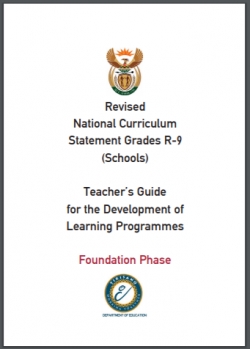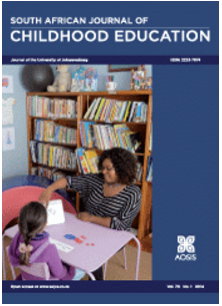A support programme for foundation phase English Second Language educators to improve the teaching of phonological awareness

Type
Thesis
Authors
Category
ECCE, Foundation
[ Browse Items ]
Publication Year
2015
Publisher
North West University, Potchefstroom, South Africa
URL
[ private ]
Pages
186 p.
Subject
Early childhood education, Primary education, Foundation Phase, Teachers, Educators, English Second Language, ESL, Phonological awareness, Support programmes, South Africa
Abstract
This study aimed to explore the knowledge, perceptions and skills of Foundation Phase English Second Language educators as determinants for developing a support programme for educators to improve their phonological awareness teaching skills. Phonological awareness skills are the most important precursor to reading skills, meaning that there is a strong correlation between phonological awareness and reading ability. However, research indicates that many educators do not have the necessary knowledge or skills to teach phonological awareness effectively. All Foundation Phase learners are compelled to have English as a First Additional Language from Grade 1 in order to prepare them for when English becomes the LoLT from Grade 4. It is therefore critical that all the language skills (including phonological awareness skills) necessary for learning are well established in the Foundation Phase. This qualitative study utilised a multiple case study with five ESL Foundation Phase (FP) educators in two rural schools in the Hartbeespoort area in the North West Province. These schools were quintile 1 government schools and all educators were employed by the Department of Basic Education. Data were collected in two phases. The first phase involved collecting data on educator knowledge, perceptions and teaching skills of phonological awareness, using open questionnaires, individual interviews, classroom observations and document analysis. Based on the findings of phase 1 a support programme was compiled to enhance the effective teaching and assessment of phonological awareness in ESL Foundation Phase classrooms. The second phase involved conducting a training workshop for the educators on phonological awareness and the support programme, to enable them to implement it in their classrooms after training. During implementation, data were gathered via classroom observations and a focus group interview was conducted afterwards to determine the value of the support programme. The findings of this study revealed that, as a result of various factors, but especially because of FP educators’ own limited proficiency in English and inadequate training with regard to phonological awareness, they did not have sufficient knowledge and teaching skills to purposefully develop learners’ phonological awareness. After receiving focused and comprehensive training and follow-up in-service support, the FP educators seemed to gain an in-depth understanding of phonological awareness, as well as improved skills in the teaching thereof. These findings were addressed in recommendations for the DBE and schools, emphasising that pre-service, as well as in-service, educators, need accurate training and constructive in-service support with regard to phonological awareness. This is essential in order to ensure that all learners learning English as a second language in the Foundation Phase, have developed sufficient phonological awareness skills to enable optimal learning in English as LoLT from Grade 4.
Number of Copies
1
| Library | Accession No | Call No | Copy No | Edition | Location | Availability |
|---|---|---|---|---|---|---|
| 1 | Potchefstroom, North West Province, South Africa | Yes |

